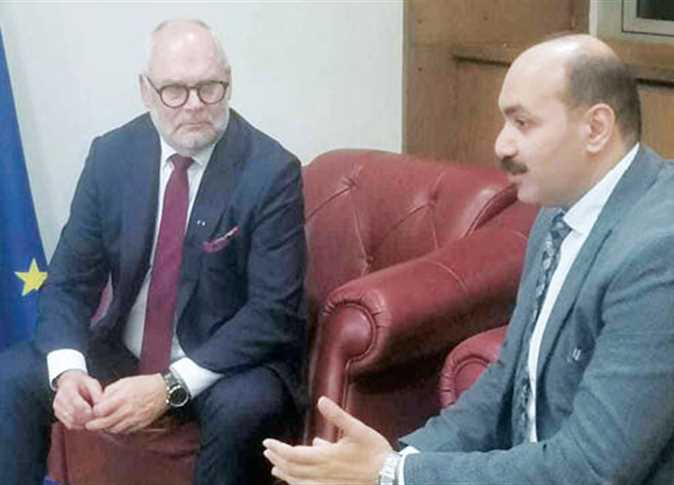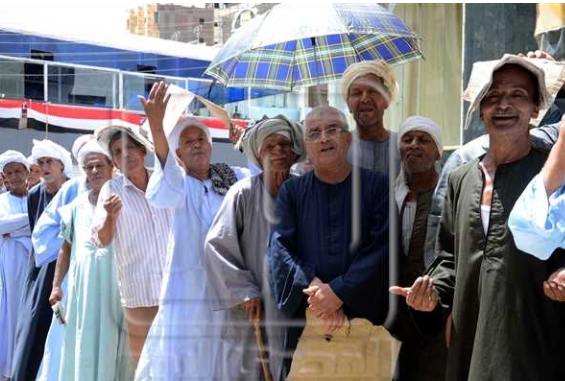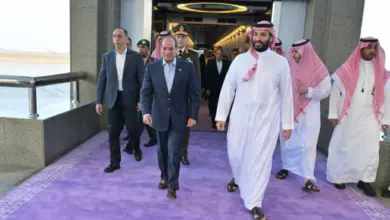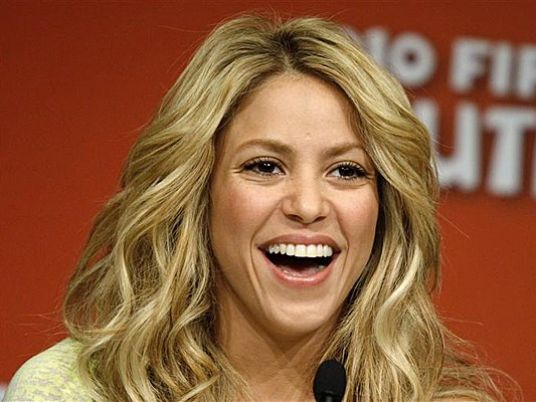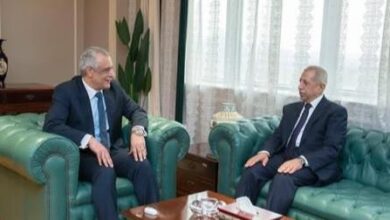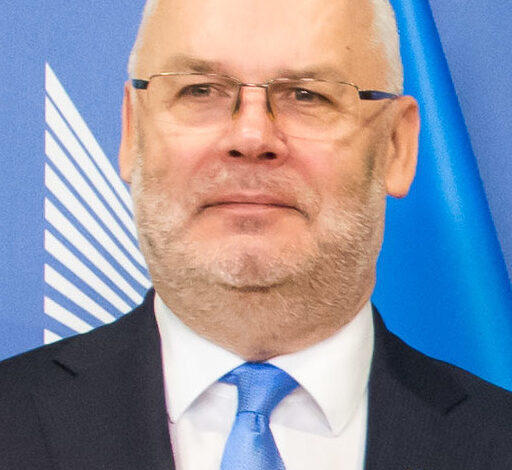
Estonian President Alar Kares, in an exclusive interview with Al-Masry Al-Youm, said that Egypt plays a major role in resolving the Palestinian issue and working to stop the brutal war that has been ongoing in the Gaza Strip for more than 13 months, and having now expanded to Lebanon.
He praised Egypt for being a large, safe, stable and attractive country for investments, and said that it is a favored destination amongst Estonian tourists.
During his visit to Al-Azhar Al-Sharif and his meeting with the Sheikh of Al-Azhar Ahmed Al-Tayeb and Pope Tawadros of Alexandria, the Estonian President further praised Egypt for having Muslims and Christians living in peace side by side.
He added that his country supports Cairo in the two-state solution and establishing peace in the region.
■ How do you see the bilateral relations between Egypt and Estonia?
– Relations with Egypt are good, and for many years we have been working to strengthen them in various fields, given Egypt’s position in the Middle East and Africa, as well as the great role it plays in the region in order to bring peace and regional and international stability.
Therefore, I was eager to visit Cairo in order to consolidate relations and increase joint cooperation.
■What are future plans regarding deepening relations economically, culturally and politically?
– As Cairo has a pivotal position, Estonia also has a role in the Baltic Sea region and Northern Europe.
Therefore, deepening friendship and partnership is important in the fields of education, so we are working on a partnership between Cairo University and the University of Estonia as we give education importance and priority.
So there is an opportunity to increase scholarships for Egyptian students to learn in our country, especially regarding computers and technology.
On the other hand, we see that Egypt has a great position and strength in education within the engineering field.
In general, we came to learn from Egypt, and we are ready to learn, especially in the fields of architecture and electrical engineering.
■ Can we know how many scholarships you will provide to Egyptian students?
– At this time, it is difficult to determine the number itself, but we have the desire and we have noticed Egypt’s interest in this regard, and we will hold discussions.
The executives will work on this measure through joint cooperation of both the Egyptian and Estonian sides within the education field in order to advance the two countries and raise their status globally.
■ What is the purpose of your visit to Egypt, and what is your impression after meeting with President Abdel Fattah al-Sisi?
-This is my first visit to Egypt while I am president, and I discussed with President Sisi the security issues in Gaza, Lebanon, the Middle East and Europe.
I stressed that the United Nations Security Council needs reform, and I agreed with Cairo on the importance of putting an end to conflicts around the world such as the wars in Gaza, Lebanon, Sudan and Ukraine.
I was accompanied by a delegation of businessmen from the energy, technology and mining fields.
We have seen the progress of Egypt, which is a stable and safe country that holds a pivotal role, as is the case with our country which is also safe.
Therefore, Egypt is considered an attractive country for investment, and there will be great cooperation in the field of tourism, given that Egypt is considered our country’s favored destination.
I would also like to confirm that Estonian companies in various sectors wish to establish partnerships with Cairo because of its great competition within the region in the field of communications, information technology and digitization.
It seeks to enhance cooperation with Egypt in this field, and during discussions with President Abdel Fattah al-Sisi, on various bilateral, regional and international issues, as well as geopolitical situations, I got to know his personality, as he carries out his duties well as president of a large country like Egypt, and I learned that he was a military man, while I was a professor, a university graduate and president of two universities in Estonia and a researcher in biology.
■ What about the volume of trade exchange?
-Trade exchange between Egypt and Estonia reached about $26.5 million during the first nine months of 2024, compared to $22.5 million during the same period last year.
We aim to raise this volume given the strength and size of Egypt in the field of various investments, as well as what it possesses regarding huge projects in various aspects of economic and commercial life.
■ You visited Al-Azhar and the Egyptian Church. What was your impression during the meeting with the Sheikh of Al-Azhar and Pope Tawadros?
-During the meeting with the Sheikh of Al-Azhar, Ahmed Al-Tayeb, I got to know this ancient institution that cares about the teachings of the Islamic religion, and I welcomed what the Sheikh of Al-Azhar proposed by providing scholarships to Estonian students, which confirms the strengthening of educational and cultural ties between the two countries.
Also, during the meeting with the Pope Tawadros, Pope of the Orthodox Church, I realized that in Egypt, “Islam and Christianity” live side by side in peace and affection, regardless of the difference in religion or sects, and the same is the case with Estonia, where everyone lives and searches for peace away from wars.
Egypt has a special nature because of the great history and civilization it carries which dates back thousands of years, as well as being richly multicultural.
■ You talked about the cultural richness of Egypt. Did you see the Grand Egyptian Museum during your visit?
– Egypt is full of ancient civilizations, which have dazzled the world. It is natural for the modern Egyptian state to be able to establish the Grand Egyptian Museum, which I was amazed by.
I realized that this museum, because it contains enormous Egyptian treasures, will receive millions of visitors from all over the world, and the New Administrative Capital also represents an impressive achievement, built in record time.
■ Regionally, how do you see Egypt’s role in resolving the Palestinian issue and Gaza, and what is your country’s position regarding Israeli genocide crimes?
– Egypt has been playing a major role in resolving the Palestinian issue for years, especially at the presidential level. There are huge efforts to stop the war on the Gaza Strip. Therefore, Estonia stands and supports Cairo in its efforts towards establishing peace and in all its efforts to work to resolve the dispute and conflict between the parties concerned
After learning from Egypt closely what is happening in Gaza, I will discuss the matter and I will make every effort with European leaders to help Egypt put an end to the war.
We also confirm that we agree with Cairo on ending the Palestinian-Israeli conflict through a two-state solution, which is supported by many countries and the United Nations. I stress that there is a necessity to work to facilitate the entry of humanitarian aid, food and medicine.
I should mention that the same tragedy that Gaza is being exposed to is similar to what Ukraine is being exposed to, as many of the Ukrainian people have left their country in search of salvation.
This has claimed many victims and resulted in thousands of injuries.
The negative effects of international and regional crises and wars, especially the Israeli war on the Gaza Strip and Lebanon, has made the world pay a heavy price as a result.
These wars resulted in many of the citizens of these countries seeking refuge in neighboring countries, and they added a great burden on these economies.
■You mentioned that Ukraine is similar to Gaza, but aren’t the civilian casualties in Kiev incomparable to the casualties of the Israeli war?
– I do not care about the number. What matters to me is that there are innocent people on both sides who have fallen, especially including women and children, in addition to the destruction of infrastructure, schools and homes.
The dead are as my dead in any country. What is important is to preserve human life and for people to live in peace.
There is an international mission to stop the Russian war on Ukraine, as well as the war on Gaza.
I also agree with you that the number of missing persons and victims in Gaza is higher, but because there are about 2.5 million Palestinians living in a small area, the victims are many.
■ But what does Estonia offer to Ukraine despite Russia’s accusations against your country?
We are participating in the reconstruction of Ukraine and we are sending humanitarian aid, just as is the case with delivering aid to Gaza, although we are trying in various ways to send it, especially with the arrival of the winter season which imposes many burdens on refugees.
If the winter is difficult for Gaza, it is also difficult for Ukraine, as conditions are harsh and difficult, and during my visit to the Kingdom of Jordan and my meeting with Jordanian King Abdullah.
Before visiting Cairo, I learned about the relief efforts and programs of the World Food Organization, which sends aid via trucks.
However, they find it difficult to enter due to Israel’s measures, so food is still stuck at the border.
■So what is your description of the Israeli war on Gaza?
I am not interested in descriptions of the Israeli war on the Gaza Strip or Ukraine.
All actions against the two peoples are “heinous,” and against humanity and those who dream of peace and global stability.
Therefore, there is a need for the international community and the United Nations to exert its pressure and influence to stop both bloody wars.
■ But I would like to tell you that many in the Middle East and even the world describe what Netanyahu is doing as similar to what Hitler did in World War II?
The two eras are different and the international circumstances are also different. The most important thing is that we do not want the war to continue and see more innocent victims.
What our country seeks is working to achieve a ceasefire and impose an end to the war that has been going on for more than 13 months.
However, the Israeli government must be held responsible for the bloodshed.
■ How do you see Trump’s victory in the US presidential elections and his relationship with Estonia, as well as the war on Ukraine?
Trump said that he would end the Ukrainian war within 24 hours.
We will see how he will fulfill his promises. While many hopes are pinned, there are, on the other hand, many fears and anxiety regarding Trump’s policy.
The important thing is that the European leaders communicated with him and we will wait for what will happen during the meetings with the Secretary-General of the North Atlantic Treaty Organization (NATO).
As for Estonia’s relationship with the US, we are a member of the European Union and we do not care who rules the White House. What concerns us is rapprochement and serious meetings to reach what is achieved.
It serves both peoples, and we previously worked during Trump’s first presidency.
The most important thing that happened is that the country concerned about itself increased its defenses, and Estonia did this by increasing its defenses by three percent, which is a high and good percentage.
■ You talked about the Russian-Ukrainian crisis. How do you see the solution after more than 33 months of military battles?
– We want this war to stop, and we are waiting for the new American administration, represented by US President-elect Donald Trump, to end the conflict.
We also support the plan of Ukrainian President Volodymyr Zelensky, which is consistent with NATO’s policy of withdrawing from the territories seized by Russia.
Zelensky’s plan was represented in five points stating the solution to end the ongoing war is not to exchange territories, in addition to his country joining NATO, while lifting the restrictions imposed on Ukraine’s use of long-range weapons to strike military targets deep in Russian territory.
But Russia is still holding on to the lands that were held in a referendum, and in return, Ukraine is holding on to recovering them. What is the solution?
The solution is to resort to international law, and we cannot imagine that anyone seizes other lands and does not want to return them, and therefore Ukraine has either victory or resistance to defend the land This is a legitimate right by Ukraine against Russia.
■ There are developments on the ground, and there is a military strategic agreement between Russia and North Korea. How do you see that?
What we know is that North Korea, which signed a military agreement with Russia, has its forces now fighting in Ukraine, which is very disturbing and unacceptable.
Pyongyang’s deployment of forces would be another violation of international law, including the basic principles of the United Nations Charter.
According to assurances from the Ukrainian President, the first combat clash of the Ukrainian army with forces from North Korea has begun.
This is yet more instability in the world, so it is important to stop the war instead of expanding it.
■ Is the world currently in the phase of a Cold War or the beginning of World War III?
I do not expect a world war to occur now or in the future.
What we are seeing now in many countries of the world is many conflicts between many countries and in different regions internationally, but not all of them rise to the level of a world war, and therefore there is a role for the United Nations and the North Atlantic Treaty Organization (NATO).
They should all work to stop the wars taking place in the world to stop the bloodshed and destruction.
■ Your country is very small compared to Russia. Aren’t you afraid of provoking Russian anger, at a time when Moscow is warning against changing the nuclear doctrine?
– Yes, Estonia is a very, very small country compared to Russia, but we are part of the European Union, and what prompted Sweden and Finland to join NATO is to distance themselves from Russia, which attacked and assaulted Ukraine, and to confirm that NATO’s role is defensive, not offensive.
